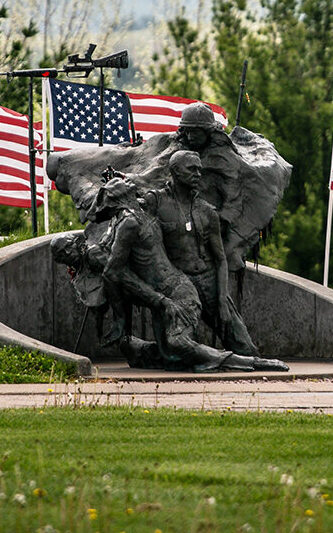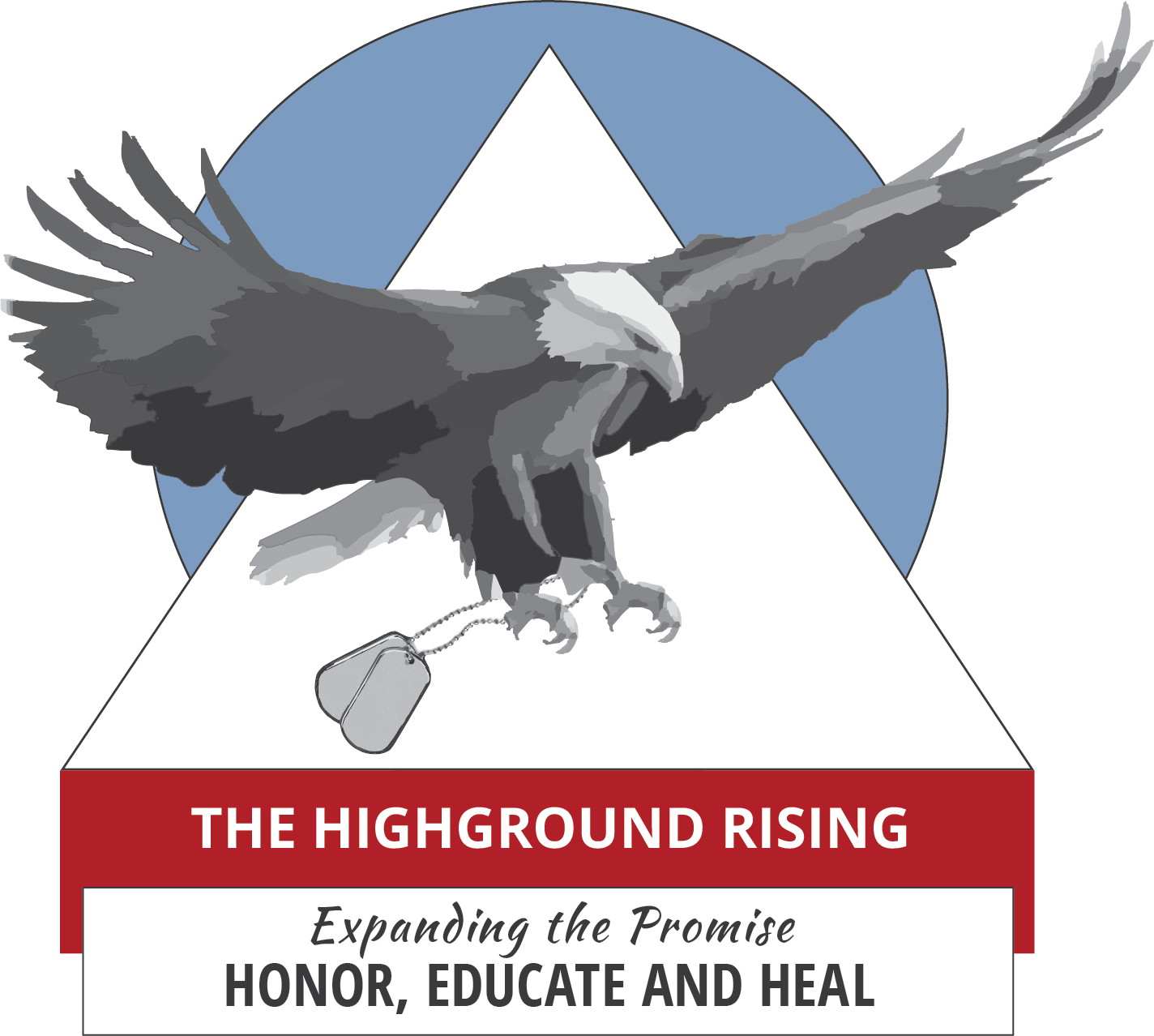All gifts and pledges are strictly confidential. Donors to The Highground Rising may choose to remain anonymous or to make their gifts in honor, in memory, or in recognition of specific individuals, events, or accomplishments in their lives. Donors may also choose to have their names or the names of designated others displayed on a plaque on a donor recognition wall. Logos may be included for contributions of $100,000 or more.
Unless a donor wishes to remain anonymous, all contributions of $1,000 or more to The Highground Rising will be permanently recognized in the facility on a Wall of Honor. The recognition will be in the form of an engraved tile. Donors will be allowed to specify in what manner they wish to have their gifts recognized. The size of the Giving Society tiles will be related to the size of the gift it recognized.

Payments on pledges can be fulfilled by cash, check, commodities, or appreciated property. Donors are advised to consult with your financial advisor if making gifts not by cash or check. Because many large corporations offer employee matching gift programs, The Highground recommends potential donors check if such a program exists with their respective employers. This is an excellent way to increase both the size and the impact of gifts to The Highground Rising Campaign.
Your pledge may be fulfilled over three to five years on whatever schedule and by whatever method of payment best suits your planning. Typically, contribution installments may be made twice a year. The Highground business office will send payment reminders for set dates. You will receive tax-deductible gift receipts for each payment made. By spreading payments out over three to five years, making a pledged gift allows you to give at your highest capacity.
An Outright Gift
An outright gift of cash is the simplest and most common way of giving. Outright gifts also include appreciated securities, bonds, or personal assets; real property assigned ownership; or beneficiary status in paid life insurance with cash value (in any single form or combination). Many of these types of gifts hold specific capital gains tax advantages and deductibility for you.
Gifts of Stock
Financial advisors may recommend using assets other than cash to make charitable gifts or fulfill pledges. For example, anyone who bought stock that has appreciated may have a potentially lucrative asset to use in making charitable gifts.
If you wish to make a stock donation, you are able to write off the stock’s value at the time of its deduction instead of writing off what you paid for it. For instance, if you have a $50,000 block of stock for which you paid $10,000, you are able to write off $50,000 on your taxes and you would also avoid paying the capital gains tax on the $40,000 in appreciation of the stock.
Description for this block. Use this space for describing your block. Any text will do. Description for this block. You can use this space for describing your block.
IRA Charitable Rollover
The IRA Charitable Rollover allows individuals aged 70 ½ or older to make direct transfers from their IRAs to qualified charitable organizations. Each transfer has a maximum of $100,000 ($200,000 per couple) in any one year. Transfers can be made in more than one installment and can go to multiple charities. Donors with retirement assets in 401k, 403b, or similar accounts must first roll those funds into an IRA and direct the IRA administrator to transfer the funds from the IRA directly to a public charity.
What charities can receive an IRA charitable rollover?
IRA charitable rollover gifts must be made directly to a 501(c)(3) public charity.
What are the tax implications of IRA charitable rollover gifts?
Because the transfers occur directly from donors’ IRAs to qualified charities, donors don’t have to count the transfers as taxable income for federal tax purposes. IRA charitable rollover transfers can count as a donor’s required minimum distribution (RMD) for the year. IRA charitable rollover transfers cannot be made to charitable gift annuities or charitable remainder trusts.
How do I initiate an IRA charitable rollover?
You must contact your IRA administrator/coordinator to initiate the transfer to a 501(c)(3) public charity. We also encourage you to notify The Highground that you are making an IRA charitable rollover.
Did you know?
- An IRA charitable distribution is a better option for donors who regularly give a portion of their income to charity and do not itemize deductions.
- Donors may want to consider a 501(c)(3) public charity as a beneficiary of their IRA because the IRS may impose taxes of up to 60 percent on IRA funds not distributed during their lifetimes.
Guidance on tax impacts of charitable giving is based on current tax law and CARES ACT changes for 2020. Please consult your tax advisor to understand the tax benefits in your individual situation.
Enhanced Charitable Giving Incentives as a Result of the CARES Act
The CARES ACT temporarily changes the Universal Charitable Deduction. Taxpayers who do not itemize their deductions can take a one-time deduction of up to $300 for gifts made to charitable organizations. The provision is intended only for the year 2020; however, in the text of the bill, it states taxable years “beginning in 2020.” and does not include a sunset date, thus it conceivably could extend beyond 2020. The deduction is only for gifts of cash made in the calendar year 2020 and does not cover other types of gifts or contributions made to donor-advised funds or private foundations.
The CARES Act suspends the 60 percent adjusted gross income limitation for individuals’ charitable contributions for the year 2020. In a typical year, an individual can only take a charitable deduction of up to 60 percent of their adjusted gross income, no matter how much he or she gives. For 2020, there is no limit, making cash contributions fully deductible.
Description for this block. Use this space for describing your block. Any text will do. Description for this block. You can use this space for describing your block.

Naming Rights
| Item(s) to be named | Suggest Gift Amount |
| Welcome Center Buildgin | $1 Million |
| Exhibit Area | $100,000 |
| Building Art (outdoor) | $250,000 |
| Eternal Flame | Reserved |
| Outdoor Observation Deck | $150,000 |
| Gift Shop | Reserved |
| Theatre Room | Reserved |
| Chapel | Reserved |
| Counseling Room | $50,000 |
| Landscape Garden (West of Building) | $50,000 |
| Doughboy Relocation Garden | Reserved |
| Upper Level Parking Area | $25,000 |
| Main Level Parking Area | Reserved |
| Main Level Accessible Parking Area | $25,000 |
| Reconfigured Lower Level Parking | Reserved |
| All Access Path | Reserved |
| Eternal Flame Path | Reserved |
| Service Organization Display Wall | Reserved |
| Exhibit Display Pad | Reserved |
| Museum History Exhibit | Reserved |
| Museum #1 | Reserved |
| Museum #2 | Reserved |
| Museum #3 | Reserved |
| Legacy Stone Office | $25,000 |
| Executive Director Office | $25,000 |
| Southern Entrance | $25,000 |
Giving Societies
| Giving Societies | Contribution of: |
| Fleet | $500,000 or more |
| Division | $250,000 or more |
| Regiment | $100,000-$249,000 |
| Battalion | $50,000-$99,999 |
| Company | $25,000-$49,999 |
| Platoon | $10,000-$24,999 |
| Squad | $2,500-$9,999 |
| Fire Teams | $1,000-$2,499 |
